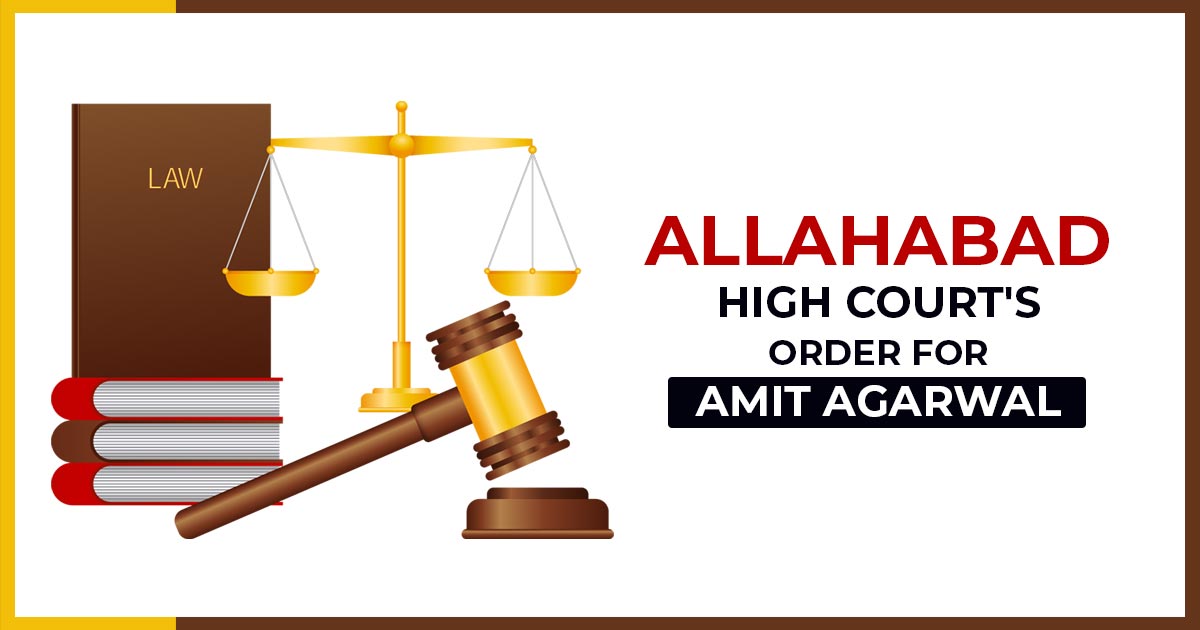
The Allahabad High Court has affirmed the termination of the Arbitrator’s role due to an unexplained delay of eight years in the proceedings.
Justice Rohit Ranjan Agarwal’s bench noted that the arbitrator presided over the case for an extended period without advancing it, and hastily issued the award after a removal request was filed. Consequently, the Allahabad High Court ruled that the arbitrator violated Section 14 and terminated their mandate under this provision.
Case Facts for Amit Agarwal
Under Article 227 two writ petitions were filed challenging the judgment of Commercial Court No.1, Meerut, permitting the application under Section 14(2) of the Arbitration & Conciliation Act, 1996 (the “Act”).
Read Also: Allahabad HC: A Notice Must Be Served on Legal Representative of Deceased Before GST Proceedings
The dispute emerged in 2006 between the applicant (Amit Agrawal) and respondent No.1. The case was referred to the sole arbitrator, Pradeep Sharma, on 25.01.2007. An interim award was challenged by respondent No.1 under Section 34 of the IT Act, and the application was allowed in 2018.
Respondent No.1 contested three other cases under Section 9 of the Act, which were dismissed in 2007. The only arbitrator, on 03.10.2014, issued an order under Section 17 of the Act. Respondent No.1, on 13.10.2014, informed the arbitrator that, as per Section 14(1)(a) of the Act, the mandate had finished.
The arbitrator held the case pending until 13.08.2015, and on 13.08.2015, respondent No.1 obtained a notice setting 30.08.2015 for the final award. Respondent No.1 filed an application under Section 14(2) on 20.08.2015 before the District Judge, Meerut, which was numbered Arbitration Case No.72 of 2015.
Recommended: GST | Allahabad HC: Tax Cases Can’t Be Relegated to Alternate Remedy if Facts Are Uncontested
The arbitrator provided the final award on 24.09.2015. Respondent No.1 filed another application under Section 14(2) on 31.05.2016, numbered as Arbitration Case No.22 of 2016, later renumbered as Arbitration Case No.142 of 2022. The Ld. District Judge allowed both applications under Section 14 of the A&C Act and terminated the mandate of the arbitrator. Aggrieved thereby, the petitioner filed two writ petitions under Article 227 challenging the judgment of Commercial Court No.1, Meerut, permitting the application under Section 14(2) of the Arbitration & Conciliation Act, 1996 (the “Act”).
Submissions of the Parties
Petitioner’s Submissions
- Section 14(2) of the Act allows a party to apply to the court for termination of the arbitrator’s mandate.
- The application was moved on 20.08.2015, before the 2016 amendment to Section 14(1). Therefore, the amended act would not apply.
- The delay must be “undue” to justify termination; mere delay is not enough.
- The petitioner contested the interim award of 2007, and the matter is still pending in court.
- The seat of arbitration was at Pune or Mumbai, not Meerut.
Submissions of Respondent
- The arbitral seat was Meerut, as authorized via correspondence and decisions like BGS SGS Soma JV vs. NHPC Limited.
- Under Section 14(2) the application was maintainable because of the arbitrator’s excessive delay.
- The delay between 2007 and 2014, with no advancement, explains termination.
- The arbitrator moved hastily after the application under Section 14(2) was filed.
Allahabad High Court Analysis and Observations
The court addressed two primary concerns: the location of the arbitration and the validity of the Section 14(2) application. It confirmed Meerut as the arbitration location based on correspondence and legal precedent.
Regarding the Section 14(2) application, the court deemed it valid due to the arbitrator’s prolonged inactivity. The arbitrator’s lack of progress from 2007 to 2014, failure to schedule dates, and sudden rush after the Section 14(2) application all contributed to establishing an unjustifiable delay.
Grounded in the concept of ‘undue delay,’ the court upheld the termination of the arbitrator’s role. It emphasized that ‘undue delay’ isn’t just any delay but requires a showing of excessive, unjustifiable, or unnecessary delay. The arbitrator’s sluggish response, along with a specific reference in the final award pending the Section 14(2) decision, justified ending the mandate.
| Case Title | Amit Agarwal |
| Citation | Matters Under Article 227 No. 11263 of 2023 |
| Date | 01.12.2023 |
| Counsel for Petitioner | Prabhakar Dwivedi, Sr. Advocate |
| Counsel for Respondent | Pankaj Dubey |
| Allahabad High Court | Read Order |








